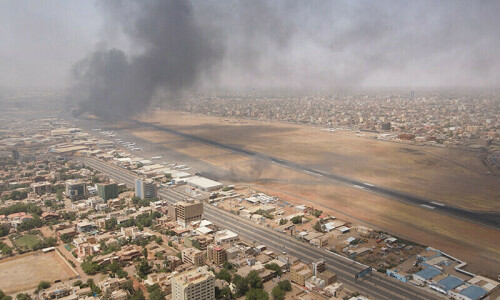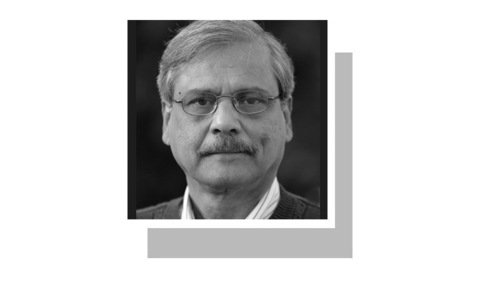KHARTOUM: Air strikes and artillery exchanges shook the Sudanese capital on Saturday and armed men ransacked the Qatari embassy as the country’s warring generals kept up their struggle for control.
Khartoum residents said that heavy fighting raged despite repeated international calls for a humanitarian truce. The area around the state television building in Khartoum’s sister city Omdurman was one of the sites bombarded, witnesses said.
On Saturday, Qatar’s embassy was the latest diplomatic mission to be attacked, drawing condemnation from Doha.
“The State of Qatar condemned in the strongest terms the irregular armed forces’ storming and vandalising its embassy building in Khartoum,” the foreign ministry said.
“The embassy staff had previously been evacuated and… none of the diplomats or embassy staff were subjected to any harm,” the ministry said.
It renewed calls for “an immediate halt to the fighting in Sudan, exercising maximum restraint… and sparing civilians the consequences of the fighting”.
Qatar did not specifically identify Daglo’s RSF as responsible but a statement from the pro-Burhan authorities put the blame squarely on the paramilitaries.
The embassies of Jordan, Saudi Arabia and Turkey have also come under attack in recent weeks.
Saturday’s attack came a day after Arab leaders meeting at a summit in Saudi Arabia urged Sudan’s feuding generals to halt the fighting.
There have been multiple failed truce efforts since the fighting started, and representatives of both sides have been holding talks in Saudi Arabia.
Asked about those talks, Saudi Foreign Minister Prince Faisal bin Farhan said on Friday that the focus was “on reaching a truce that allows Sudanese civilians to take a breather”.
Although the main fighting is being played out in Khartoum, the violence has also spread to the war-ravaged western region of Darfur, where the RSF has its roots.
In South Darfur capital Nyala, fighting since Thursday has killed 22 people forcing civilians to flee for safer areas as shells crash on their homes, the bar association in Darfur has said. On Friday, UN aid chief Martin Griffith said he was allocating $22 million in emergency funds to help Sudanese fleeing the violence.
The funds will help relief efforts in Chad, the Central African Republic, Egypt and South Sudan where Sudanese have sought refuge, he said.
The United States promised $103 million for Sudan and neighbouring countries to support displaced people.
The power struggle between regular army chief Abdel Fattah al-Burhan and his former deputy-turned-rival Mohamed Hamdan Daglo, who heads the paramilitary Rapid Support Forces (RSF), erupted into fighting on April 15.
The conflict has killed hundreds of people, most of them civilians, and displaced more than one million. The United Nations has warned of a fast-deteriorating humanitarian situation in Africa’s third-largest country, where one in three people already relied on aid before the war.
On Friday, Burhan sacked Daglo, giving his title of vice president of the ruling Sovereign Council to former rebel leader Malik Agar, and appointed three allies to top jobs in the military.
A former rebel leader who signed a peace deal with Khartoum authorities in 2020, Agar said in a statement Saturday he was determined to try to “end the war” and press for negotiations. He also addressed Daglo directly saying “Sudan’s stability can only be re-established by a professional and unified army”.
The integration of the RSF into the regular armed forces has been the main bone of contention between Daglo and Burhan.
The force, which traces its origins to the notorious Janjaweed militia recruited in the early 2000s to crush a rebellion by ethnic minority groups in Darfur, is highly mobile but has a reputation for being ill-disciplined.
Its fighters have been accused of widespread break-ins and looting, including at diplomatic missions and aid group offices.
Published in Dawn, May 21st, 2023















































Dear visitor, the comments section is undergoing an overhaul and will return soon.